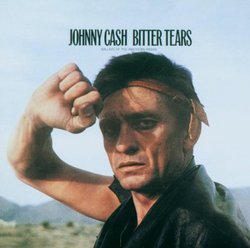One of Cash's shortest but best albums...
ewomack | MN USA | 08/23/2004
(5 out of 5 stars)
"Johnny Cash had Cherokee blood in him. That fact, along with a strong sense of justice, provides rocket fuel for the passion that pervades "Bitter Tears". At his 1969 Madison Square Garden concert, Cash said "...the ballad of the American Indian is a sad song..." The mood of this entire CD fits that statement. The musical arrangements lean toward the stark and minimal, providing an apt backdrop to the bitter, defeated, and sometimes defiant lyrics.
Most of the songs on "Bitter Tears" come from the songbook of a Pima-Indian, Peter LaFarge. LaFarge served in the Korean War, worked with Cisco Houston, made numerous recordings for Folkways and Columbia, and died in 1964 (of either suicide or stroke). That same year Columbia released "Bitter Tears". This CD now stands as an unplanned tribute to LaFarge (the original liner notes refer to LaFarge in the present tense, so hopefully he lived to hear Cash's interpretations of his songs).
Johnny Cash wrote "Apache Tears" and "The Talking Leaves". LaFarge wrote the remaining songs except J.Horton's "The Vanishing Race". The CD contains nothing but outstanding songs, many of which refer to real historic people or events.
"As Long as The Grass Shall Grow" sums up the history of broken treaties. After the American Revolution, the United States found itself very weak. To placate the American Indians (many of who fought on the side of the British), the US government offered numerous peace treaties promising land "as long as the grass shall grow and the waters flow". US Courts later interpreted such phrases as pure metaphor, and denied claims to land that the treaties promised. LaFarge uses the real life example of the damming of Allegheny River, and the consequent dislocation of many Native Americans, near Pittsburgh as proof of these broken treaties.
"The Ballad of Ira Hayes" is a true story. Ira Hayes actually helped raise the flag on Iwo Jima in 1945, returned home a broken man, turned to drinking, and died far too young. The song stands as Hayes' all too accurate poetic biography. Pete LaFarge's bleak lyrics apparently offended some, but no one can deny their raw power. In the context of "Bitter Tears" they bring out the paradox of the patriotic Pima Indian who helped defend the country that treated his people as second-class citizens. The song hit number 3 on the charts. Not a typical hit for any artist.
"Custer" is a real eyebrow-raiser. It celebrates the downfall of Custer, complete with chuckles and sarcasm: "Well, Custer split his men/well he won't do that again/And the general he don't ride well anymore"; "It's not called an Indian Victory, but a bloody massacre"; "There might have been more enthusin' if us Indian's had been losin'". As the liner notes say: "The contents of this album is the Indian's side of the story."
Other topics on the CD include: Native Americans dating white women (and the problems that can result); the creation of the Cherokee alphabet through the discovery of 'talking leaves'; the 're-education' of Native Americans by the United States goverment.
"Bitter Tears" gushes with sadness, bitterness, and lost hopes. It may offend, inspire, enlighten, depress, anger, or confuse, depending upon one's viewpoint. But without question, a fair listen to this CD will evoke some response, and that's one of the main reasons it will remain one of Johnny Cash's greatest works."
Johnny Cash's tribute to his Native American roots
David Kenner | Fort Worth, Texas United States | 05/29/2000
(5 out of 5 stars)
"Johnny Cash is one of those performers who can sing anything and make it work. Recent albums containing covers ranging from Hank Snow to Soundgarden bear witness to this. But there are several albums in his catalog that are even more exceptional than the average Cash collection. Bitter Tears is one of these exceptional experiences. 8 classic cuts about the history, the trials and the pride of the American Indian. Rarely has an artist recorded more emotionally moving material. There are several great Johnny Cash best-of's out there, but this is an essential CD to own in addition to the greatest hits collections. Especially noteworthy are Cash's performances of songs by the late Native American singer-songwriter Peter LaFarge, who composed 5 of the 8 tracks on this disc. After listening to this, I would recommend purchasing LaFarge's discs, currently available from the Bear Family label in Germany."
What's an Indian, anyway?
Johnny Heering | Bethel, CT United States | 08/15/2005
(5 out of 5 stars)
"This is an outstanding, politically concious "concept album". Johnny Cash had great empathy for the downtrodden, and who has been more downtrodden than the American Natives? Nobody. So, this is a very heartfelt album. Here is what Cash wrote about this album is his autobiography: "Bitter Tears, in which I was inspired by the Native American songwriter Peter LeFarge, was an intense research project. I dove into primary and secondary sources, immersing myself in the tragic stories of the Cherokee and the Apache, among others, until I was almost as raw as Peter. By the time I actually recorded the album I carried a heavy load of sadness and outrage; I felt every word of these songs, particularly "Apache Tears" and "The Ballad of Ira Hayes". I meant every word, too. I was long past the point of pulling my punches.""

